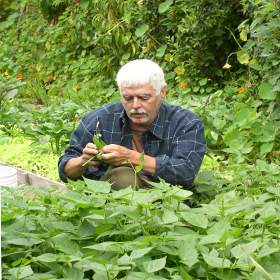



"It is not the critic who counts: not the person who points out how the strong person stumbles or where the doer of deed could have done them better. The credit belongs to the person who is actually in the arena, whose face is marred by dust and sweat and blood, who strives valiantly, who errs and comes up short again and again...who spends himself in a worthy cause; who, at the best, knows in the end, the triumph of high achievement, and who, at the worst, if he fails, at least fails while daring greatly...."
-- Theodore Roosevelt, 1910, quoted by Joe Klien, Time Magazine
Jules Dervaes, teacher, leather artisan, and urban homesteader, resides in Pasadena, California.
Originally from Tampa, Florida, he entered Loyola University in New Orleans in 1965 where he became increasingly disillusioned with the American way of life and his Catholic upbringing.
Without prior knowledge of the Worldwide Church of God, he began making changes in his personal beliefs that he much later discovered were in accord with the Bible. After graduating from Loyola in 1969, he continued a physical/spiritual journey in his search for a better way of life, one that would be of benefit to his future family as well as of service to mankind.
His first step took him to the University of Oregon where he enrolled in graduate school as part of his training as a VISTA volunteer. This avenue of service was abruptly terminated when his local draft board refused to grant him a deferment during the Vietnam War.
As a conscientious objector, he began serving others through teaching. Ultimately, this career choice gave him keener insight into the futility of America’s future and its inability to nurture the human spirit. As a teacher, he saw first-hand the lack of character development in his students who were to be our country’s next generation of parents. Convinced that there must be a better society and more humane way of life somewhere, he traveled extensively through Europe as he considered the future course for his life. In 1973 he immigrated to New Zealand, believing that that isolated, egalitarian society could assist him and his family in living a more integrated, meaningful life. It was there, living as a homesteader and beekeeper, that he found God’s truth and was baptized by Worldwide Church of God minister in 1974.
Through a series of meaningful events, Mr. Dervaes and his young family were led back to Tampa in 1975 where they were members of the WCG congregation for nine years. Although “home again” physically, he never abandoned his spiritual search for an ever-deepening understanding and direction for his existence, knowing that it had to be God’s way or no way. In 1983, as a result of significant changes in circumstances, he decided to enroll at Ambassador College and was accepted in 1984.
While attending Ambassador College, Mr. Dervaes became aware of significant problems in the Church. After the death of the church’s founder in 1986, Mr. Dervaes brought these problems to the attention of the new leader, Mr. Joseph Tkach, Sr. These writings and warnings are a part of Mr. Dervaes’ history with the WCG and are called THE LETTER TO LAODICEA and THE HIDDEN YEARS.
What happened to the Dervaes family and the Church, is recorded, only in part, in THE HIDDEN YEARS. For, there is much more that could be said and volumes that could be written. Yet, there is enough information in the book to help us all move forward to future hope of God’s Kingdom on earth as we take action and begin the actual physical/spiritual work that God expects from us. The rest of the events about the Church, the splinter groups and each member of the Dervaes family is a continuing story which remains to be told. For, therein lies not only the problems but also the solutions for the Church, the family and the world in general.
Since being disfellowshipped from the Worldwide Church of God in 1986, Jules Dervaes and his family have worshipped alone as a family–and continue to do so to this day.
Sabbaths and Holy Days are spent in a similar way to the early Christians: as a family at home or enjoying nature.
Text by Staff Member